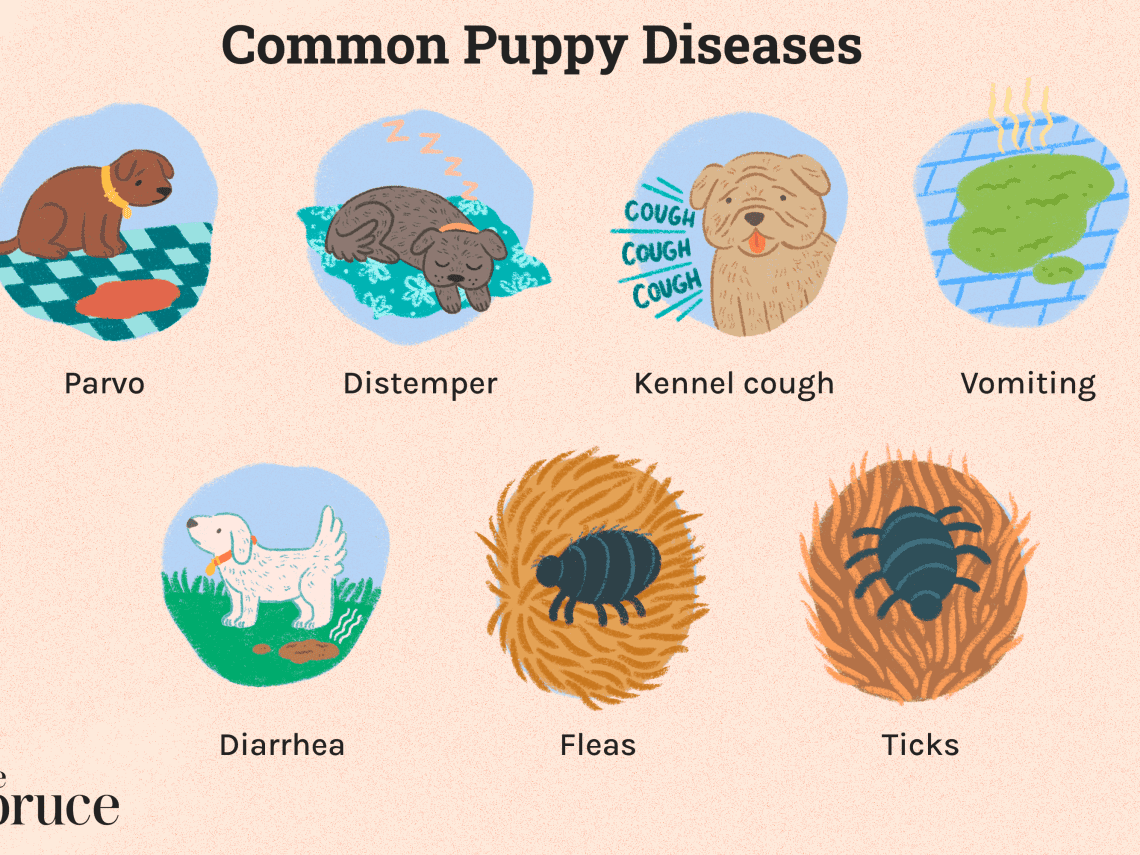
The main diseases of puppies
Contents
Infectious diseases
This group includes canine distemper, infectious hepatitis, parvovirus enteritis and infectious tracheobronchitis. Puppies and young dogs are most susceptible to these diseases, with unvaccinated or incompletely vaccinated animals at higher risk.
Immediately after birth, with the first portions of mother’s milk, puppies receive protective antibodies that remain in the blood of babies until the age of 8-10 weeks, which is why the first vaccination against viral infections should be done at this age, otherwise the puppy will be defenseless against these diseases. The main symptoms of viral infections are lethargy, fever, refusal to feed, vomiting, diarrhea, discharge from the nose and eyes, and cough. The best help in this situation is a quick visit to the veterinary clinic, because as a result of vomiting and diarrhea in puppies, as in kittens, and in young children, dehydration sets in very quickly, which worsens the prognosis and makes treatment more difficult.
Infectious diseases are usually severe and do not go away on their own, so the best thing a puppy owner can do when their pet’s health changes is to seek professional veterinary help as soon as possible.
Parasitic diseases
Puppies quite often suffer from external parasites, which include fleas, ear (otodectosis) or scabies (sarcoptic mange) mites, and infection with another external parasite, cheyletiella, is not uncommon. All these diseases are manifested by itching of the skin, scratching, secondary skin infections and hair loss can be observed. Otodectosis is manifested by itching of the ears and the presence of discharge in the lumen of the auditory canal. Generalized juvenile demodicosis usually occurs in young dogs under the age of 1,5 years.
All puppies are infected with internal parasites, so the regular and constant use of antihelminthic drugs is a necessary measure. If worms are found in the puppy’s feces, it is worth collecting parasites for analysis, this will help you choose an effective drug and treatment regimen specifically against the identified parasites.
There is no universal antiparasitic agent that would rid a puppy of internal parasites once and for all, it is important to regularly use special agents in accordance with the recommendations of a veterinarian.
The absence of visible parasites in the puppy’s feces does not exclude infection with helminths, in most cases the invasion is asymptomatic.
Nutritional stress and dietary disturbance
Curious puppies actively explore the world, they often pick up and eat everything that they meet on their way. It can be food waste found on the street, “treasures” from the bin, or food from the table if the puppy accidentally got to it. All these feasts often end in vomiting and diarrhea.
Unfortunately, puppies often eat plastic bags, food wrappers, which can lead to intestinal obstruction. It can also be caused by swallowing socks or parts of toys.
Injuries, domestic hazards
Like all children, puppies often get injured, this is due to increased activity and lack of experience. The most common are bone fractures and sprains.
Unfortunately, puppies are often hit by cars or bitten by others. dogs.
In the house, too, there are threats to the health of pets, especially babies. For example, household chemicals can be very toxic and even deadly to animals, so keep cleaning products, laundry detergents, and other household items out of the reach of puppies and children.





